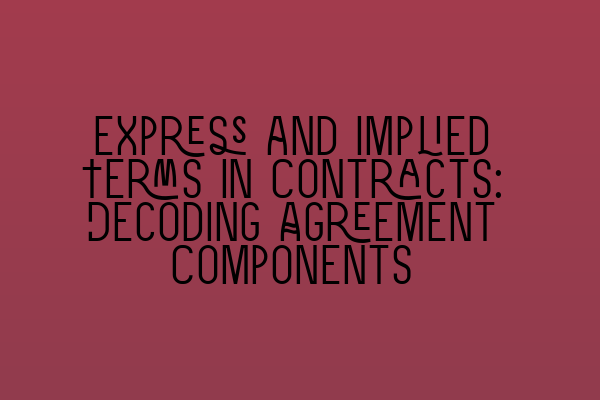Express and Implied Terms in Contracts: Decoding Agreement Components
Welcome to our blog post on express and implied terms in contracts. Understanding the different components of an agreement is crucial for anyone involved in contract law. Whether you’re a solicitor, aspiring lawyer, or studying for the SQE exams, this article will help you navigate through the complexities of express and implied terms.
What are Express Terms in Contracts?
Express terms are the specific elements that parties agree upon and include in their contract. These terms can be in written or verbal form, but it’s always best to have written evidence to avoid any potential disputes. When drafting a contract, it is important to clearly define the express terms to create a legally binding agreement.
Examples of express terms can be found in clauses pertaining to price, delivery, warranty, and payment terms. These terms outline the rights and obligations of each party and provide a clear understanding of their respective responsibilities.
Express Terms: Key Features
Express terms possess certain key features that distinguish them from other parts of a contract:
- Specificity: Express terms must be precise and clear. Ambiguous or vague terms can lead to misunderstandings or disagreements.
- Intention to Create Legal Relations: Express terms should indicate the intent to create a legally binding agreement. If the parties do not intend to be legally bound, the term may not be enforceable.
- Form: Express terms can be either written or oral, although it is advisable to have written evidence for easier interpretation and enforcement.
It is essential to review express terms carefully to ensure that all parties have a mutual understanding of their obligations and rights from the onset of the contract.
Implied Terms: The Unspoken Understandings
Unlike express terms, implied terms are not explicitly stated in the contract but are nonetheless understood to be included based on various factors, including legislation, common law, and the intentions of the parties involved.
An implied term can be:
- Implied in Fact: These terms are inferred by looking at the nature of the contract, the conduct of the parties, and the circumstances surrounding the agreement.
- Implied in Law: These terms are imposed by law to protect the rights and interests of the parties involved, even if they were not explicitly agreed upon.
Implied terms play a crucial role in ensuring fairness and equity in contracts, filling in gaps that may not have been explicitly addressed in the express terms.
Implied Terms: Degrees of Implication
Implied terms can vary in degree, depending on factors such as:
- Business Efficacy: The term is necessary to give business efficacy to the contract, making it workable and achieving its intended purpose.
- Officious Bystander Test: The term would be included if a hypothetical officious bystander were asked whether it should be included to make the contract workable.
- Previous Dealings or Custom: The term has been implied based on the parties’ previous conduct or customary practices in similar situations.
It is important to note that not all terms can be implied, and it usually depends on the specific circumstances of each case.
Balancing Express and Implied Terms
Express and implied terms work in harmony to create a comprehensive contract. While express terms provide clarity and certainty, implied terms ensure fairness, reasonableness, and the fulfillment of the parties’ intentions.
As a solicitor or legal professional, it is crucial to carefully consider both express and implied terms when drafting or analyzing contracts. Ensuring that the contract reflects the parties’ intentions, protects their interests, and complies with relevant laws and regulations is paramount.
Enhance Your Contract Law Knowledge with SQE Training
If you’re studying for the SQE exams or looking to improve your skills and knowledge in contract law, SQE Contract Law can help you succeed. Check out these related articles to enhance your understanding:
- SQE Sample Papers: Practice for Exam Success
- Adjusting Your SQE Strategy Based on Mock Performance
- Peer Discussions Post-Mock: Learning from Collaboration and Feedback
- Adjusting Strategy Based on Mock Performance: Improving Your Approach
- Strengthening Weak Areas in SQE: Targeted Practice for Improvement
By staying up-to-date with relevant resources and continuously improving your knowledge, you’ll be better equipped to excel in the world of contract law and achieve success in the SQE exams.
We hope this blog post has provided valuable insights into express and implied terms in contracts. Remember to consult with legal professionals for specific advice and guidance tailored to your unique situations and jurisdiction.
